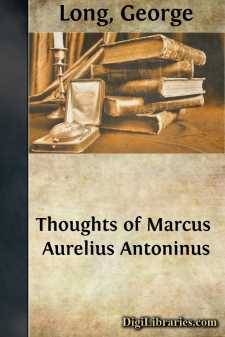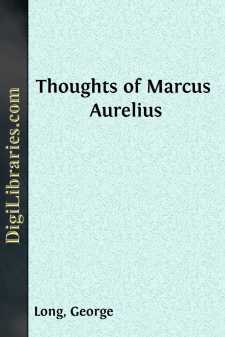Categories
- Antiques & Collectibles 13
- Architecture 36
- Art 48
- Bibles 22
- Biography & Autobiography 813
- Body, Mind & Spirit 142
- Business & Economics 28
- Children's Books 17
- Children's Fiction 14
- Computers 4
- Cooking 94
- Crafts & Hobbies 4
- Drama 346
- Education 46
- Family & Relationships 57
- Fiction 11829
- Games 19
- Gardening 17
- Health & Fitness 34
- History 1377
- House & Home 1
- Humor 147
- Juvenile Fiction 1873
- Juvenile Nonfiction 202
- Language Arts & Disciplines 88
- Law 16
- Literary Collections 686
- Literary Criticism 179
- Mathematics 13
- Medical 41
- Music 40
- Nature 179
- Non-Classifiable 1768
- Performing Arts 7
- Periodicals 1453
- Philosophy 64
- Photography 2
- Poetry 896
- Political Science 203
- Psychology 42
- Reference 154
- Religion 513
- Science 126
- Self-Help 84
- Social Science 81
- Sports & Recreation 34
- Study Aids 3
- Technology & Engineering 59
- Transportation 23
- Travel 463
- True Crime 29
Thoughts of Marcus Aurelius Antoninus
by: George Long
Categories:
Description:
Excerpt
BIOGRAPHICAL SKETCH
MARCUS AURELIUS ANTONINUS.
M. Antoninus was born at Rome, A.D. 121, on the 26th of April. His father, Annius Verus, died while he was praetor. His mother was Domitia Calvilla, also named Lucilla. The Emperor T. Antoninus Pius married Annia Galeria Faustina, the sister of Annius Verus, and was consequently the uncle of M. Antoninus. When Hadrian adopted Antoninus Pius and declared him his successor in the empire, Antoninus Pius adopted both L. Ceionius Commodus, the son of Aelius Caesar, and M. Antoninus, whose original name was M. Annius Verus. Antoninus then took the name of M. Aelius Aurelius Verus, to which was added the title of Caesar in A.D. 139: the name Aelius belonged to Hadrian's family, and Aurelius was the name of Antoninus Pius. When M. Antoninus became Augustus, he dropped the name of Verus and took the name of Antoninus. Accordingly he is generally named M. Aurelius Antoninus, or simply M. Antoninus.
The youth was most carefully brought up. He thanks the gods () that he had good grandfathers, good parents, a good sister, good teachers, good associates, good kinsmen and friends, nearly everything good. He had the happy fortune to witness the example of his uncle and adoptive father Antoninus Pius, and he has recorded in his word (; ) the virtues of the excellent man and prudent ruler. Like many young Romans he tried his hand at poetry and studied rhetoric. Herodes Atticus and M. Cornelius Fronto were his teachers in eloquence. There are extant letters between Fronto and Marcus, which show the great affection of the pupil for the master, and the master's great hopes of his industrious pupil. M. Antoninus mentions Fronto () among those to whom he was indebted for his education.
M. Cornelii Frontonis Reliquiae, Berlin, 1816. There are a few letters between Fronto and Antoninus Pius.
When he was eleven years old, he assumed the dress of philosophers, something plain and coarse, became a hard student, and lived a most laborious, abstemious life, even so far as to injure his health. Finally, he abandoned poetry and rhetoric for philosophy, and he attached himself to the sect of the Stoics. But he did not neglect the study of law, which was a useful preparation for the high place which he was designed to fill. His teacher was L. Volusianus Maecianus, a distinguished jurist. We must suppose that he learned the Roman discipline of arms, which was a necessary part of the education of a man who afterwards led his troops to battle against a warlike race.
Antoninus has recorded in his first book the names of his teachers, and the obligations which he owed to each of them. The way in which he speaks of what he learned from them might seem to savor of vanity or self-praise, if we look carelessly at the way in which he has expressed himself; but if any one draws this conclusion, he will be mistaken. Antoninus means to commemorate the merits of his several teachers, what they taught, and what a pupil might learn from them. Besides, this book, like the eleven other books, was for his own use; and if we may trust the note at the end of the first book, it was written during one of M. Antoninus' campaigns against the Quadi, at a time when the commemoration of the virtues of his illustrious teachers might remind him of their lessons and the practical uses which he might derive from them.
Among his teachers of philosophy was Sextus of Chaeroneia, a grandson of Plutarch. What he learned from this excellent man is told by himself (). His favorite teacher was Q. Junius Rusticus (), a philosopher, and also a man of practical good sense in public affairs. Rusticus was the adviser of Antoninus after he became emperor. Young men who are destined for high places are not often fortunate in those who are about them, their companions and teachers; and I do not know any example of a young prince having had an education which can be compared with that of M. Antoninus. Such a body of teachers distinguished by their acquirements and their character will hardly be collected again; and as to the pupil, we have not had one like him since....












